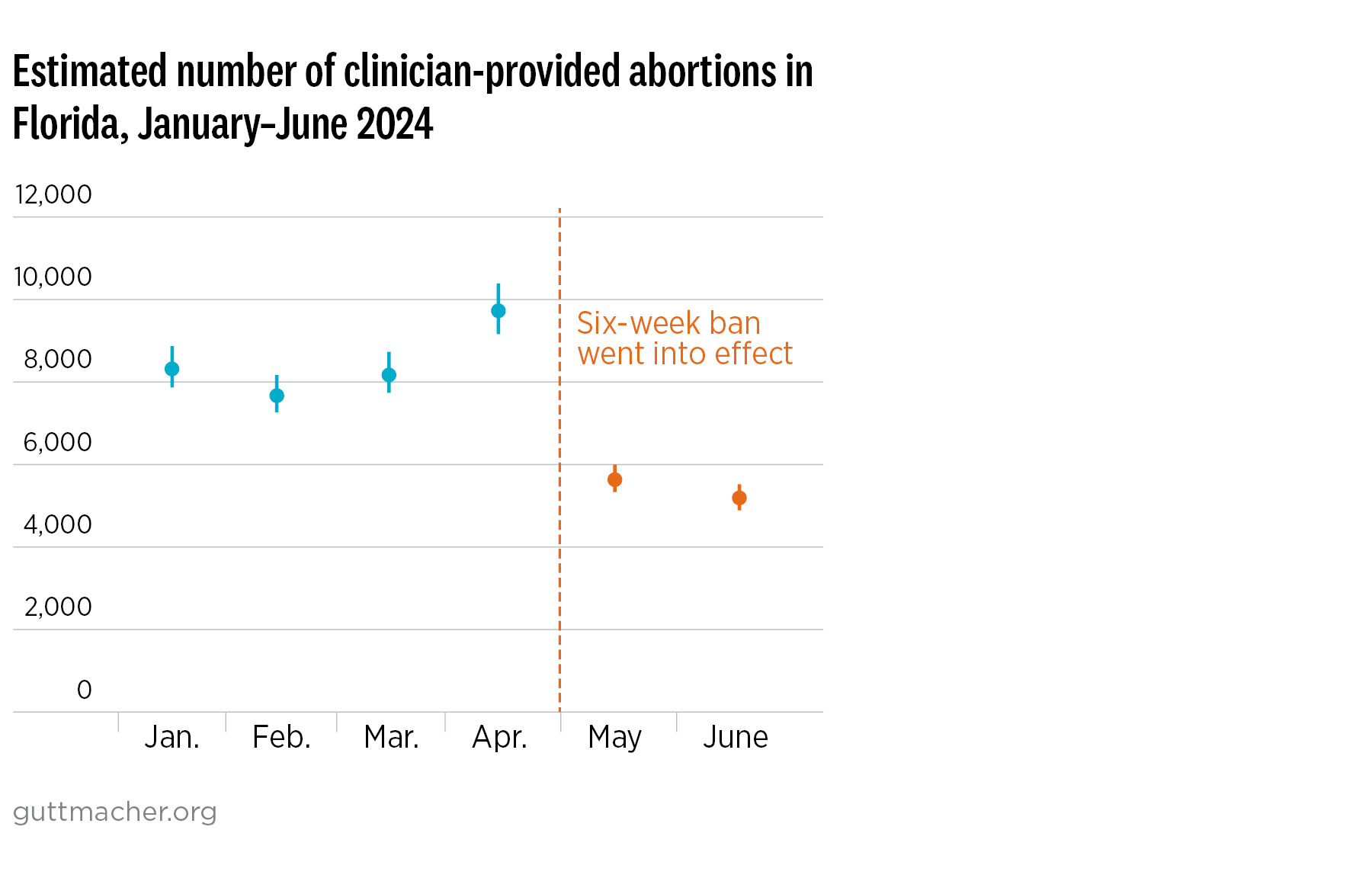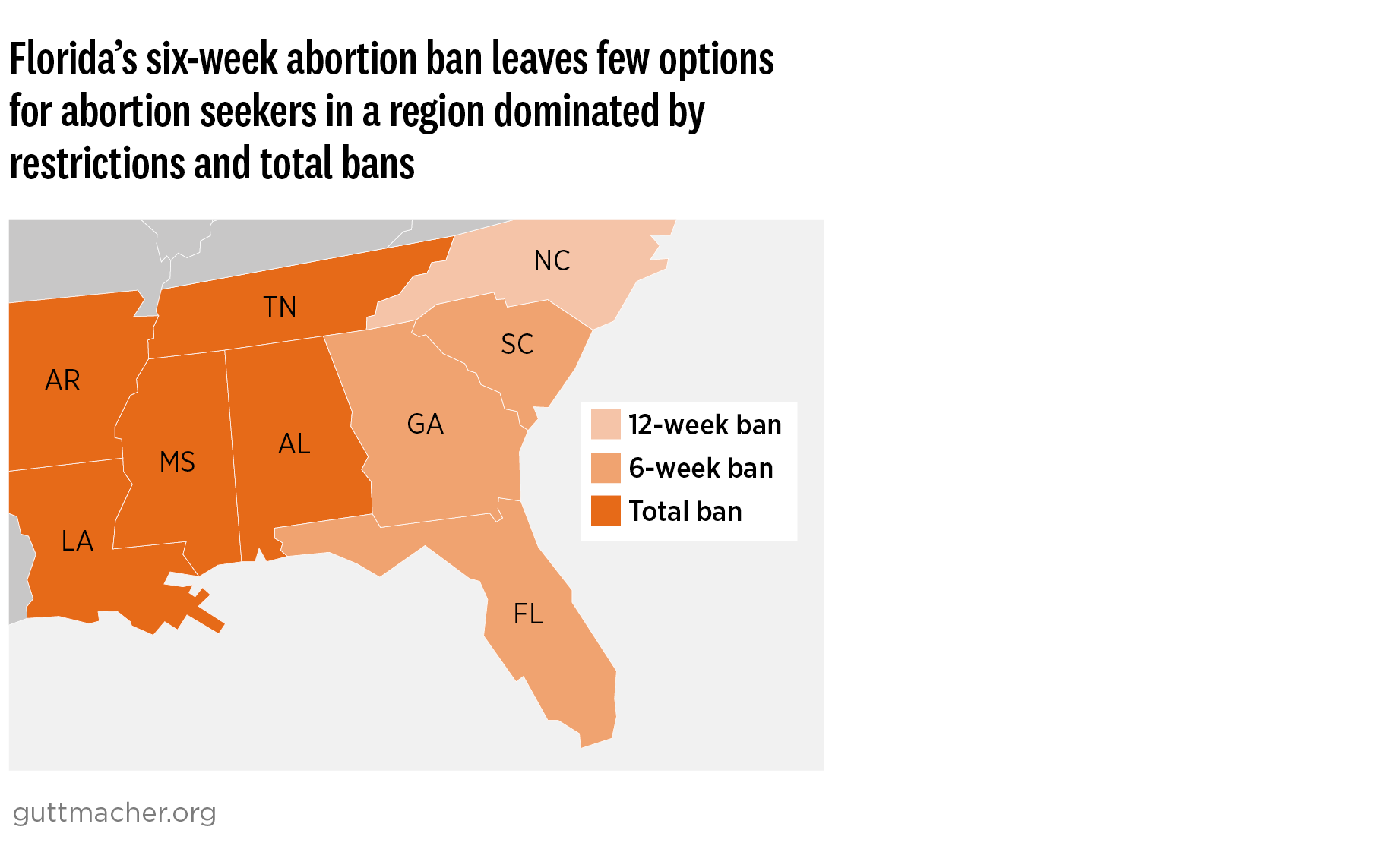New estimates from Guttmacher’s Monthly Abortion Provision Study show that clinician-provided abortions dropped substantially in Florida after a ban on abortions after six weeks’ gestation took effect on May 1, 2024. The decline likely reflects reductions in access to abortion for Florida residents as well as people from neighboring states with abortion bans who would have traveled to Florida for abortion care.
In the first three months of 2024, there were approximately 8,050 clinician-provided abortions per month in Florida. After the ban went into effect, the number of clinician-provided abortions dropped to an estimated 5,630 in May (a decrease of 30% from the monthly average for January–March*) and 5,200 in June (a 35% decrease from January–March).† This followed a large increase in April, as providers and patients went to great lengths to provide and access care, respectively, before the law went into effect. In that month, the number of abortions provided by clinicians was around 9,730, which is almost 1,700 higher than the January–March monthly average (a 21% increase).
While there can be seasonal patterns in abortion counts, other states around the country did not experience the sharp increase in April or subsequent steep declines that occurred in Florida. In other states without total abortion bans, the total number of estimated abortions decreased by 5% in April 2024 compared with January–March, decreased by 2% in May and decreased by 9% in June.
Florida’s Six-Week Abortion Ban Increased Obstacles to Care
Even before the six-week ban, there were serious barriers to abortion access in Florida. Prior to the US Supreme Court’s 2022 decision in Dobbs v. Jackson Women's Health Organization that overturned Roe v. Wade, people seeking abortion in Florida had to navigate a number of obstacles created by legislators. These include medically unnecessary ultrasound requirements, mandatory in-person counseling 24 hours before an abortion (requiring two clinic visits) and parental consent requirements, among others.
In 2022, a 15-week abortion ban took effect in Florida just days after the Dobbs decision. Following a series of legal proceedings that caused months of uncertainty for abortion patients and providers, the law banning abortion six weeks after a person’s last menstrual period took effect on May 1, 2024. The law also prohibits the mailing of abortion pills, allocates funds to the state’s alternatives to abortion program and restricts the use of state funds to pay for travel for abortion care.
Since Florida's immediate neighbors have either a total (Alabama) or six-week (Georgia) abortion ban in effect, there are regional and even national implications to Florida’s abortion policies. The closest options for Florida residents who need in-clinic abortion care after six weeks are now several states away and subject to their own sets of restrictions. The average one-way distance a Florida resident who is more than six weeks’ pregnant needs to travel to an abortion clinic is around 590 miles to North Carolina—where abortion is banned after 12 weeks’ gestation and patients are required to undergo a medically unnecessary in-person counseling visit 72 hours before obtaining an abortion. As a result, some Florida residents are likely traveling even farther distances to states with fewer restrictions, or to Puerto Rico, further complicating the logistical and financial costs of accessing abortion care.
Floridians are not the only ones affected by the state’s restrictive new law. The six-week ban also worsens access to abortion in the South more broadly, as Florida was a key access point in a region dominated by total and six-week abortion bans. In 2023, an estimated 9,000 people traveled to Florida to obtain an abortion, with particularly large numbers of people coming from Texas, Louisiana, Mississippi, Alabama and Georgia. Since May 1, residents of these states have faced additional barriers to accessing in-person abortion care in the region.
Being forced to travel across state lines for an abortion often poses logistical and financial difficulties, which have become even more pronounced under Florida’s six-week ban. Raising money for the cost of the abortion, travel and lodging, missed wages, child-care costs and more means that the difficulties of receiving needed abortion care are substantially increased and for some, insurmountable. Early gestational duration bans also do not exist in a vacuum: Pre-existing policies in Florida (such as the mandatory in-person counseling visit 24 hours before a procedure) further increase the risk that patients will miss the legal cutoff time, particularly when traveling from out of state.
The disparate impact of the six-week abortion ban on patients traveling from out of state is supported by data from Planned Parenthood clinics in Florida, which provided almost a third of clinician-provided abortions in the state in 2023. Those clinics saw an 80% decline in the number of out-of-state residents obtaining abortion care in May 2024 compared with May 2023.‡ The same clinics also saw evidence of disparate impact by race, with a 40% decline year over year among Black patients (both Florida residents and those from out of state) compared with 25–33% declines among other racial and ethnic groups. Research has long shown that while abortion bans and other restrictions harm all people who need an abortion, these laws cause even greater harm to those already subject to systemic racism and economic injustice.
Abortion Funds and Telehealth Helped People Seeking Care in Florida
In 2023, approximately 60% of abortions in Florida occurred after six weeks’ gestation. While many people who would have had an abortion after six weeks are now unable to access care under a six-week ban, others may find a way to obtain an abortion in-state in that shortened time frame. For those who are able to surmount the substantial obstacles to obtaining an abortion by the legal cut-off—including recognizing a pregnancy in time to do so—support networks often play key roles in allowing patients to overcome barriers to accessing care quickly.
The 30% decrease from the January–March monthly average of clinician-provided abortions in the first month after Florida’s six-week ban took effect is substantial, but it does not match the steeper declines seen in Georgia, South Carolina and Texas following the implementation of six-week bans in those states. Several factors may account for this, each of which tells a story about organizations and individuals filling gaps created by harmful anti-abortion policies.
First, Florida’s abortion ban took effect with a well-practiced infrastructure of abortion funds and support organizations ready to match patients to services within the legal time frame, due to the abortion restrictions already imposed in Florida and the long lead time between the ban’s passage and implementation. However, donations to many abortion funds are dropping or leveling off even as expenses for patients increase, so Florida’s abortion support infrastructure may struggle to match current levels of demand.
Second, the changing landscape of abortion provision—particularly the option to obtain medication abortion via telehealth from providers in states with abortion shield laws—has likely helped ameliorate some of the negative impacts of Florida’s six-week ban. Many Florida residents had been obtaining this type of telehealth abortion care even before the six-week ban went into effect in May; because abortions provided via mail from out of state under the protection of shield laws are available past Florida’s six-week cutoff, this type of clinician-provided care will likely continue to play a critical role for many state residents. Some people will also continue to access abortion care through community networks and via medication obtained from sources outside the United States. It is unclear how many Florida residents may increasingly rely on these alternatives to clinician-provided care under the six-week ban, and these types of sources are not included in Guttmacher’s estimates.
More Shifts in Florida’s Abortion Policy Landscape Are Likely
Florida’s abortion policy will continue to be in flux. The state’s history of legislating on abortion and the strong public outcry to the overturning of Roe v. Wade mean the current six-week abortion ban is not likely to be the end of the story. Florida’s Amendment 4 is on the statewide ballot this November. If 60% of voters approve the measure (Florida is one of 11 states requiring more than a simple majority or other criteria to pass constitutional amendments), it would establish a constitutional right to abortion before viability and likely trigger new legal challenges in order to overturn the state’s abortion bans and restrictions.
The precarious nature of abortion access in Florida, fostered by relentless anti-abortion policy and legal challenges, mirrors the current situation of abortion policy regionally and nationwide. Florida’s recent six-week abortion ban demonstrates that a state’s abortion policies can affect patient access and care throughout a region and even the country, further underscoring the devastating consequences of overturning Roe. Only through strong, bold policies at all levels of government can we begin to restore abortion rights and access to ensure everyone can get the abortion care they need.

